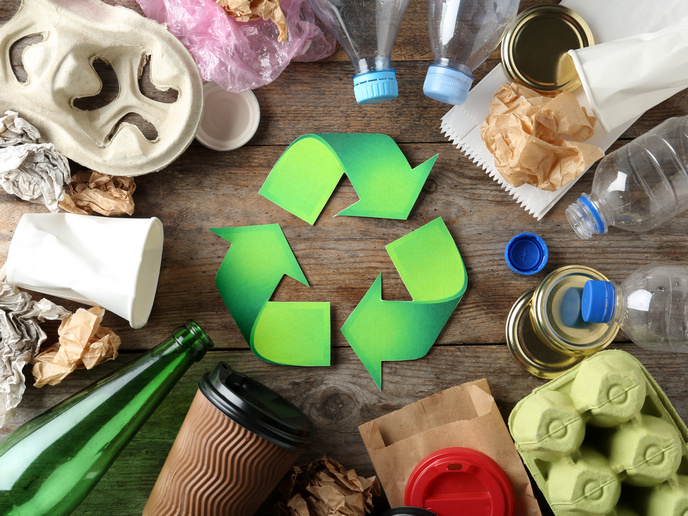Enzyme-powered circular packaging
The global movement towards a circular economy continues to grow, calling for radical innovation across industries. Addressing the pressing challenge of recycling and reusing flexible multilayer (ML) and multi-compound packaging materials used for various perishable goods, the EU-funded TERMINUS(opens in new window) project stands as a ground-breaking initiative. Led by a cross-disciplinary team spanning eight EU countries, this venture aims to revolutionise the handling of complex packaging materials through the development of smart enzyme-containing polymers. TERMINUS focuses on enhancing the circular economy while meeting stringent targets set by the European Commission. The project tackles the formidable task of unlocking the recycling potential of flexible ML packaging used for food, beverages, cosmetics and other goods liable to spoilage. By integrating selected enzymes into adhesives and tie layers, TERMINUS enables separation of different polymeric layers essential to recycling processes. Moreover, the enzymes are engineered to endure processing temperatures, ensuring their functionality during material transformation.
Pioneering the transition to a circular economy
The successful application of de-gluing processes in the initial design of materials is a pivotal achievement of TERMINUS. Incorporating enzymes into adhesives and employing triggering mechanisms (such as UV or chemical activation) has enabled the separation of layers in laminated and co-extruded plastic ML packaging. However, challenges were encountered – notably in selecting potent enzymes to degrade polyurethane adhesives which are traditionally non-biodegradable. “To be sure they will survive the temperatures encountered during the processing of the materials, these enzymes have been designed to be temperature-shielded and on-demand – liberated by a specific triggering,” says Vincent Verney, TERMINUS scientific and technical coordinator. Through meticulous formulation adjustments and enzyme selection such as isolating laccases and cutinases, significant progress was made. Tailored polyurethane-based adhesives and biodegradable tie layers were developed alongside innovative technologies like nano layered-double hydroxide to protect enzymes and optimise separation efficiency during recycling.
The circularity market opportunity
TERMINUS has showcased industrial-scale processing of its packaging materials, demonstrating its potential for integration into European manufacturing. This pioneering approach offers a unique selling proposition: materials are designed for efficient end-of-life treatment, paving the way for circularity in various sectors beyond packaging, e.g. textiles and coatings. “However, if an economic analysis has been carried out well, it necessitates an improvement in various use cases to open new opportunities. This original concept could be used in any materials constituted of different physical or chemical structures, such as in the textile sector for coatings,” adds Verney.
A digital passport for future expansion
Post-project, the focus is shifting towards expanding TERMINUS technology. Initiatives are underway to leverage natural deep eutectic solvents(opens in new window) (NADES) extensively within the concept, fostering further innovation and market-readiness. One standout aspect of TERMINUS is the creation of a digital data group to disseminate critical information regarding the packaging material. This includes informing recycling centres about potential enzymatic residues in waste streams. “Based upon this point, we have started to build up a Terminus ML digital passport for bringing different levels of information relative to the audience addressed – for example with a technical description for recyclers, with environmental and safety information for consumers,” adds Verney. The project also participated in the Plastics Circularity Multiplier(opens in new window) initiative and The Bio Innovation of a Circular Economy for Plastics(opens in new window), collaborating with like-minded projects. As TERMINUS pioneers a new era in sustainable packaging, its legacy extends beyond innovation—it champions a holistic approach towards a circular economy, emphasising collaboration, innovation, and informed engagement across industries and stakeholders.







